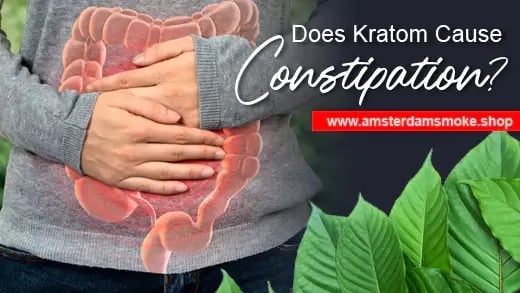
Does Kratom Cause Constipation?
The globally popular Kratom into your daily routine causes many concerns in the body. One common concern among users is can Kratom cause constipation? The simple answer is yes. Frequent use of Kratom can result in constipation, which, although not a serious medical issue, can be uncomfortable to deal with.
However, there is no need to worry. Our comprehensive guide below is designed to address all your queries. Let’s discuss Kratom-induced constipation, and how you can cure it with tips on modifying your diet and lifestyle.
Pure Leaf Kratom Powder White Borneo

$69.95
Pure Leaf White Borneo Kratom Powder Pure Leaf Kratom White Borneo Powder is a premium quality kratom strain, sourced directly from the lush rainforests of...… read more
Out of Stock
What Is Kratom Induced Constipation?
Kratom-induced constipation refers to a commonly experienced side effect by regular users of Kratom. Typically, this condition occurs when individuals consume high doses of Kratom over an extended period. In such cases, it slows down bowel movements, leading to difficulty in passing stool and discomfort. Those who consume Kratom in mild-to-moderate amounts are less likely to experience this condition.
Why Does Kratom Cause Constipation?
There are primarily two reasons why Kratom causes constipation:
Decrease In Fluid Levels
One of the primary reasons why Kratom cause constipation is dehydration. Kratom is known to have diuretic effects, which means that it can increase urine production and lead to dehydration if users do not consume enough fluids. Dehydration can cause the body to absorb more water from feces and other bodily wastes during digestion, resulting in harder, clumpy stool that can be challenging to pass.
Delayed Food Digestion
Kratom contains alkaloids such as mitragynine and 7-hydroxymitragynine, which can delay the emptying of the stomach and the movement of food through the intestines. This can lead to irregular bowel movements and constipation.
Furthermore, when Kratom cause constipation, it can also affect the normal peristaltic movements of the intestines, which are responsible for pushing food and waste through the digestive tract. This disruption can slow down the transit time of waste materials.
How To Overcome If Kratom Cause Constipation?
The link of Kratom and constipation can be uncomfortable, but there are ways to manage it. By making some lifestyle and diet adjustments, you can overcome this issue and continue to enjoy the benefits. Here are some tips:
Increase Water Intake
An effective way of Kratom constipation treatment to counteract the dehydrating effects is by increasing your water intake. Medical professionals, dietitians, and fitness advisors recommend drinking at least 4 to 6 large glasses of water daily, but you should increase this further if you are suffering from constipation.
If you’re struggling to drink water, here are some tips:
- Drink a full glass of water before every meal.
- Keep a separate water bottle in every room or place you spend your time.
- Replace sugary drinks or soda with water.
- Take small sips of water throughout the day.
- Flavor your water with fruit, mint, or lemon for a more pleasant taste.
Another way to consume water is by taking your daily Kratom dose in the form of Kratom tea instead of powder or capsules. This will not only give you the benefits you need but will also provide you with extra water.
Adjust Your Diet
Eating a balanced diet high in fiber also helps manage Kratom-induced constipation. Fiber can help soften your stool and keep your digestive system moving smoothly. Some foods high in fiber include:
- Fruits such as apples, berries, and pears
- Vegetables such as broccoli, carrots, and spinach
- Whole grains such as oats, quinoa, and brown rice
- Legumes such as lentils, beans, and chickpeas
Exercise Regularly
Regular exercise can also help relieve constipation caused by Kratom. Exercise increases blood flow to the digestive system, which can help promote bowel movements. Additionally, physical activity can help reduce uneasiness, which is known to contribute to constipation.
Bowel Retraining: A Solution When Kratom Cause Constipation
Bowel Retraining, a surprising yet effective practice, if you think kratom can constipate you. This practice involves setting up a schedule to have regular bowel movements.
For instance, you can train your body to pass stool at specific times throughout the day, such as after every meal or immediately after waking up in the morning. This minor practice can help regulate your body clock and improve your digestive system.
However, it's crucial to keep in mind that delaying passing stool can worsen the condition. Therefore, it's essential to go to the bathroom as soon as you feel the urge to train your body to pass stool easily and regularly.
Laxatives And Probiotics
If you've tried increasing your water intake, fiber, and exercise, but still find yourself struggling with kratom-induced constipation, there are other options to consider. Over-the-counter laxatives and probiotics can help alleviate the discomfort.
One example of a laxative is mineral oil, which can stimulate bowel movement within six to eight hours of consumption. Probiotic supplements are another option that can regulate bowel movements and promote gut health in general.
Adjusting Your Kratom Dosage
One crucial aspect to consider when Kratom makes you Constipated is the dosage consumed.
While the lifestyle and diet adjustments listed above are effective ways to manage, it's important to monitor the amount and strain you take.
Here are four tips to keep your Kratom dosage in check:
- Reduce your quantity
- Alternate your dose on a day-to-day basis
- Switch to mildew stains from stronger ones
- Try moderate vein colors such as Greens and Whites instead of potent ones such as Reds or Golds and Yellows.
Potential Long-Term Effects Of Chronic Constipation
If you're dealing with chronic constipation, it's important to be aware of the potential long-term consequences. Here are some of the possible complications that can arise:
- Hemorrhoids or Piles
- Fecal Impaction
- Bowel Incontinence
- Rectal Prolapse
- Anal Fissures
Conclusion
Kratom causes constipation and it’s affirmative. However, there are some effective tips and remedies to mitigate this side effect. While kratom is a beneficial herb, caution must be exercised due to its complex nature. It is crucial to adhere to the principle that less is more. However, moderate dosages are optimal to maximize its benefits to avoid adverse effects such as dehydration. Additionally, minor adjustments to one's diet can significantly alleviate constipation.
Bumble Bee Kratom Powder Red Borneo

$27.95
Bumble Bee Kratom Powder Red Borneo Bumble Bee Red Borneo Kratom Powder delivers a classic, soothing kratom experience rooted in the natural beauty of Borneo’s...… read more
FAQs
Can I still take Kratom If I'm Constipated?
Yes you can continue taking Kratom. However, it's important to drink plenty of water and maintain a proper diet.
How Often Should I Use Kratom If I'm constipated?
It's best not to use Kratom too frequently to prevent constipation. Using it two to three times per week is enough to enjoy its health benefits while avoiding this discomfort.




